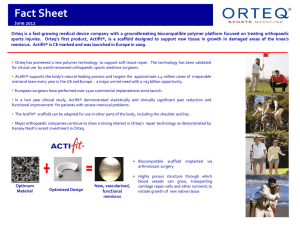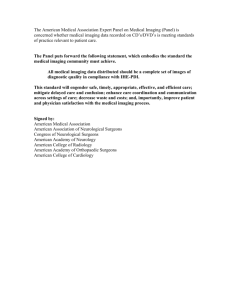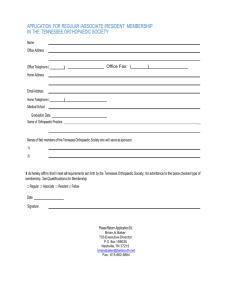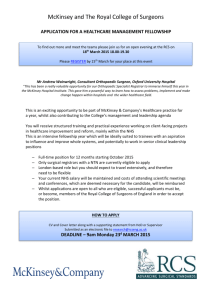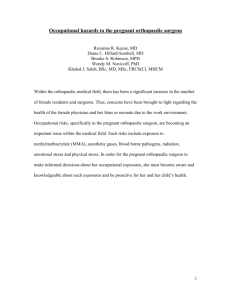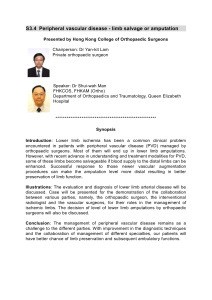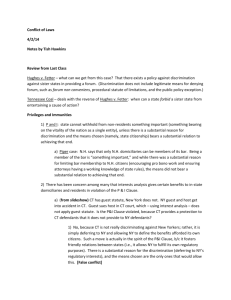Documents PDF - The Supreme Court Opinion Writing
advertisement
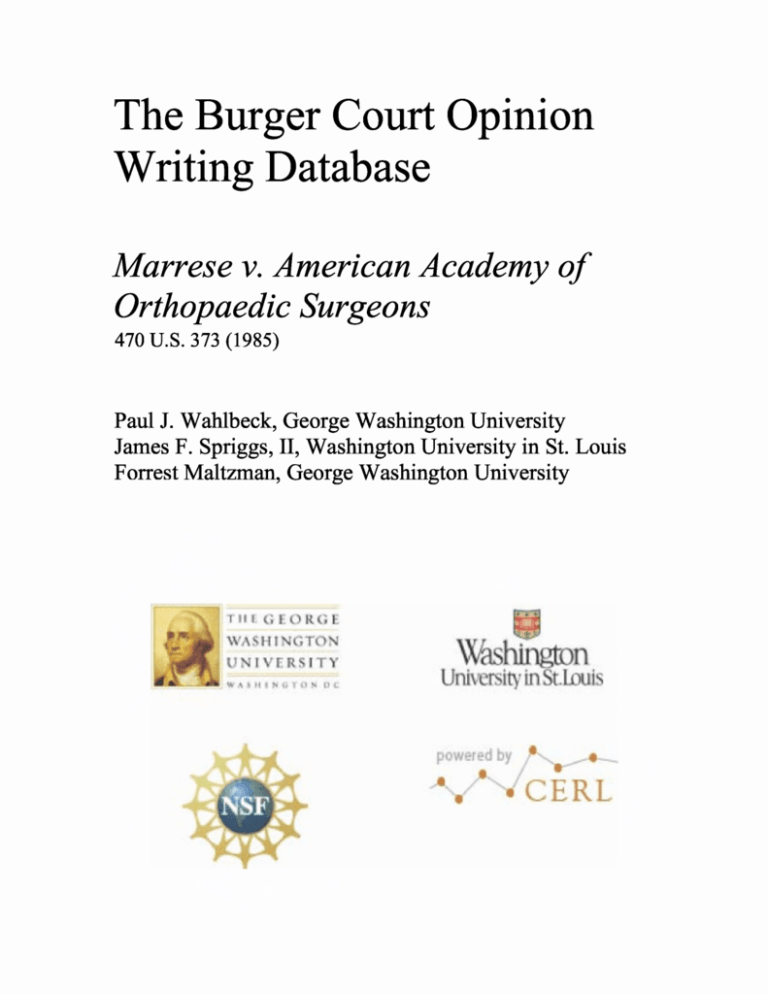
The Burger Court Opinion Writing Database Marrese v. American Academy of Orthopaedic Surgeons 470 U.S. 373 (1985) Paul J. Wahlbeck, George Washington University James F. Spriggs, II, Washington University in St. Louis Forrest Maltzman, George Washington University Supreint Court of flit Atiteb jkates 2upkg December 21, 1984 Inztokingten, CHAMBERS OF THE CHIEF JUSTICE RE: No. 83-1452 - Marrese v. American Academy of Orthopaedic Surgeons Dear Sandra: I have no difficulty at all with your conclusion that S1738 requires federal courts to look first to state law to determine the preclusive effect of a prior state-court judgment on a later action in federal court. Indeed, I cannot see how we could conclude otherwise after our decision in Migra. I do, however, have two concerns with the opinion, one relatively minor and the other more substantial. 1. I think that we must address the jurisdictional issue that was before the Court of Appeals before we proceed to consider the merits of the case. As you recall, there was a question whether the District Court had jurisdiction to certify the res judicata issue to the Court of Appeals after the case had already been brought to the Court of Appeals on the contempt issue. See 726 F.2d, at 1152. If the res judicata issue was not properly before the Court of Appeals, it necessarily is not properly before us. Thus, although the parties did not discuss the jurisdictional question in this Court, we, as always, have an independent obligation to address the matter. I agree with your implicit conclusion that the Court of Appeals was correct in its resolution of the question, but should we not expressly so hold before reaching the merits? 2. On a more substantive level, I am not certain that the wisest disposition of this case is a remand with directions to consider Illinois claim preclusion law. Although the Illinois courts appear to have adopted the Restatement principle discussed at page 9 of your opinion, that principle would not dispose of this case. The petitioners clearly could have raised their antitrust claims under the Illinois antitrust statute in their prior state-court lawsuits. Whether that possibility precludes the later assertion of those claims under the Sherman Act is a question for which the principles of Illinois res iudicata doctrine provide no answer. In this situation, I believe that it is appropriate for a federal court, deciding whether a statecourt judgment bars a federal suit asserting federal rights, to formulate a federal rule. I doubt that S1738 requires a court in this situation to make an "Erie guess," since the issue so directly affects federal rights and federal procedure. If this is correct, then it should be appropriate for us to evaluate the validity of the rule articulated in Nash County Board of Education v. Biltmore Co., 640 F.2d 484 (CA4), cert. denied, 454 U.S. 878 (1981), and applied by the Court of Appeals in the present case. For me, this is the more difficult issue. I regard Nash as sound, and would be inclined to adopt its holding. I believe, however, that it is not applicable to the present case, because of the differences between the Illinois antitrust statute and the Sherman Act, and would reverse on that ground. I could happily join your opinion if you could add something along these lines. Justice O'Connor Copies to the Conference .84 SQ VII S Anprnitt (gone of tItt *niter Atatto `Plookington, 34. al. zopkg CHAMBERS OF THE CHIEF JUSTICE January 14, 1985 RE: No. 83-1452 - Marrese v. American Academy of Orthopaedic Surgeons Dear Sandra: In trying to be brief in my earlier memorandum, I am afraid I wasn't very clear. I agree with you that CA7 approached §1738 too narrowly and technically by holding it irrelevant on the ground that Illinois law does not address the preclusive effect of a state-court lawsuit on a Sherman Act lawsuit. As you note, this precise question would never arise under state res judicata doctrine. I agree that §1738 requires federal courts to examine the general principles of state claim preclusion law. I also agree that, as we held in Migra, a federal court is not free to give a statecourt judgment greater preclusive effect than it would have under state law. But did we grant certiorari in this case simply to reaffirm what we held in Migra? The point that I was attempting to make is that there is a more general question here that may be susceptible of resolution through reference to general principles of state res judicata doctrine, but that does not appear to be answered by Illinois doctrine. That question is: if a plaintiff brings a suit in a court of limited jurisdiction, does the plaintiff's ability to assert a certain theory of recovery in that court preclude later assertion of that same theory under cover of a statutory right over which the first court lacked jurisdiction? Any state court -system with courts of limited jurisdiction is likely to have confronted this question; my understanding, however, is that no Illinois court has done so. If my understanding is correct, then I believe that on remand it would be appropriate for the District Court to formulate a federal rule. It may be that you will accommodate these views in the revisions you are making in response to Lewis's memorandum of December 29. The validity of CA4's holding in Nash County Board 2 of Education presents, I think, a very difficult question. Although I would be inclined to adopt the holding of that case, I will not pursue this point if the Court does not wish to confront it directly. Regards, 't' Justice O'Connor Copies to the Conference iihtprente elostrt of UK ptittb *atm Atickingtorn, (4. 2rIptg CHAMBERS OF THE CHIEF JUSTICE January 29, 1985 Re: 83-1452 - Marrese v. American Academy of Orthopaedic Surgeons Dear Sandra: I fear we are not on the same "wave length" on this case, and I will have something around as soon as possible. Regards, Justice O'Connor Copies to the Conference r To: Justice Brennan Justice White Justice Marshall Justice Blackmun Justice Powell Justice Rehnquist Justice Stevens Justice O'Connor From: The Chief Justice Circulate& Recirculated. 1st DRAFT SUPREME COURT OF THE UNITED STATES No. 83-1452 R. ANTHONY MARRESE AND MICHAEL R. TREISTER, PETITIONERS v. AMERICAN ACADEMY OF ORTHOPAEDIC SURGEONS ON WRIT OF CERTIORARI TO THE UNITED STATES COURT OF APPEALS FOR THE SEVENTH CIRCUIT [March —, 1985] CHIEF JUSTICE BURGER, concurring in the judgment. I agree with the Court's implicit conclusion that the Court of Appeals approached 28 U. S. C. § 1738 too narrowly and technically by holding it irrelevant on the ground that Illinois law does not address the preclusive effect of a state court judgment on a federal antitrust suit, see 726 F. 2d, at 1154. In the circumstances presented by this case, a fair reading of § 1738 requires federal courts to look first to general principles of state preclusion law. Those principles control if they clearly establish that the state court judgment does not bar the later federal action: Only recently, we reaffirmed in Migra v. Warren City School District Board of Education, — U. S. — (1984), that a federal court is not free to ac- cord greater preclusive effect to a state court judgment than the state courts themselves would give to it. The Court now remands with directions for the District Court to consider Illinois claim preclusion law, but no guidance is given as to how the District Court should proceed if it finds state law silent or indeterminate on the claim preclusion question. The Court's refusal to acknowledge this potential problem appears to stem from a belief that the jurisdictional competency requirement of res judicator doctrine will dispose of most cases like this. See ante, at 8. J F B 2719• t f rPita Abaco notrington, Q. 2Dpig *vow (4ottrt of BEA'S OF JUSTICE Wm. J. BRENNAN, JR. December 18, 1984 No. 83-1452 Marrese v. American Academy of Orthopaedic Surgeons Dear Sandra, I agree. Sincerely, in Justice O'Connor Copies to the Conference £4 19 61:1g ienprsint eland of littllitittb States Patitington, P. 2D && CHAMBERS or JUSTICE BYRON R. WHITE February 5, 1985 83-1452 - Marresse v. American Academy of Orthopaedic Surgeons VU Dear Sandra, ft Please join me. Sincerely yours, /657, 111.-P" Justice O'Connor Copies to the Conference Onfrant Cloud of tile Ilititth Otero F. 2rvig CHAMISER$ OF JUSTICE THURGOOD MARSHALL February 7, 1985 Re: No. 83-1452-Marrese and Treister v. American Academy of Orthopaedic Surgeons Dear Sandra: Please join me. Sincerely, T .M. Justice O'Connor cc: The Conference "apron:to Gland of flit linittb Ohara Initarington. P. (4. 20pkg CHAMBERS OF JUSTICE LEWIS F POWELL,JR. December 29, 1984 83-1452 Marrese v. American Academy of Orthopaedic Surgeons Dear Sandra: While I join your opinion, I write to suggest clarification on one point that may cause the lower courts Som confusion. On page 6 you correctly state that "the federal determine whether state law would give precourt should clusive effect to the prior state judgment" and on page 8 you remark that "[o]nly if state law indicates that a particular claim or issue would be barred, is it necessary to determine" if there is an exception to 51738 arguing against claim preclusion. It seems to me that confusion may arise from the failure to say how a federal court is to determine what state law is on this issue. As antitrust claims are subject to exclusive federal jurisdiction, there will be no authorative state cases indicating what preclusive effect prior state court judgments should have on them. Technically speaking, then, there may never be any state law on this issue. Later you indicate how a court might make this determination. On page 9, it is noted that "[c]laim preclusion generally does not apply where 'the plaintiff was unable to rely on a certain theory of the case or to seek a certain remedy because of the limitations on the subject matter jurisdiction of the courts ....'" This suggests that federal courts should look in part to general state jurisdictional competency requirements, not only to whether state law would preclude the federal claim if it were subject to concurrent, rather than exclusive, federal jurisdiction. I agree with your approach to this difficult issue. My only concern is relative to clarification. It would help, I think to be more explicit as to how a federal court is to determine this kind of issue. Sincerely, Tfii -5 Justice O'Connor lfp/ss cc: The Conference 72? `11" p Supreme qtrart of fire $5tatto 2ripig ltitteltingtrim. ERS OF JUSTICE WILLIAM H. REHNQUIST January 2, 1985 Re: No. 83-1452 Marrese v. American Academy of Orthopaedic Surgeons Dear Sandra, Please join me. Sincerely, 1/1/Pirt• Justice O'Connor cc: The Conference To: The Chief Justice Justice Brennan Justice White Justice Marshall Justice Blackmun Justice Powell Justice Rehnquist Justice Stevens Justice O'Connor ' Circulated. DEC 1 7 1984 From: Recirculated: 1st DRAFT SUPREME COURT OF THE UNITED STATES No. 83-1452 R. ANTHONY MARRESE AND MICHAEL R. TREISTER v. AMERICAN ACADEMY OF ORTHOPAEDIC SURGEONS ON WRIT OF CERTIORARI TO THE UNITED STATES COURT OF APPEALS FOR THE SEVENTH CIRCUIT [December —, 1984] JUSTICE O'CONNOR delivered the opinion of the Court. This case concerns the preclusive effect of a state court judgment in a subsequent lawsuit involving federal antitrust claims within the exclusive jurisdiction of the federal courts. The Court of Appeals for the Seventh Circuit, sitting en banc, held as a matter of federal law that the earlier state court judgment barred the federal antitrust suit. 726 F. 2d 1150 (1984). Under 20 U. S. C. § 1738, a federal court generally is required to consider first the law of the State in which the judgment was rendered to determine its preclusive effect. Because the lower darts did not consider state preclusion law in this case, we reverse and remand. I Petitioners are board-certified orthopaedic surgeons who applied for membership in respondent American Academy of Orthopaedic Surgeons (Academy). Respondent denied the membership applications without providing a hearing or a statement of-reasons. In November, 1976, petitioner, Dr. Treister, filed suit in the Circuit Court of Cook County, State of Illinois, alleging that the denial of membership in the Academy violated associational rights protected by Illinois common law. Petitioner, Dr. Marrese, separately filed a similar action in state court. Neither petitioner alleged a vi- i Ct2 od C/2 p—I 0 a Oaptente (purl flit linitItt 'Raft Paokintott,P. etrpg CHAMBERS OF JUSTICE SANDRA DAY O•CONNOR January 2, 1985 Re: 83-1452 Marrese v. American Academy of Orthopaedic Surgeons Dear Chief, Thank you for your letter concerning this case. ; i,H I think your suggestion that we address the jurisdictional issue is appropriate and I will do so in the next draft by inserting a new part II. It seems clear that the original appeal by respondent from the criminal contempt judgment did not transfer jurisdiction over the entire case to the Court of Appeals. Thus the pendency of the appeal from the contempt judgment did not prevent the District Court from subsequently certifying the denial of the motion to dismiss for immediate appeal under 28 U.S.C. §1292(b). Pa Your remaining substantive comments would require a major alteration in the present draft. In essence, I interpret your suggestion to be that CA7 adopted the right approach, but simply erred in concluding that the Illinois Antitrust Act is close enough to the Sherman Act to justify preclusion. This view would make it unnecessary to consider state preclusion law in federal antitrust suits. 5 1-4 In reviewing my votes from conference, I do not find that view to be indicated by the majority of the seven justices participating in the case. Perhaps my notes are incomplete or inadequate. I had at least thought the circulating draft properly explained why the principle of comity and our own precedents indicated that federal courts are not free to give state court judgments greater preclusive effect than they would have under the law of the state rendering judgment. It is true that a state court would never confront the specific issue whether a federal antitrust claim is precluded by a prior state judgment. Nevertheless, state preclusion law is not irrelevant even in this context. As the circulating draft indicates, the proper question would appear to be whether general 2 principles of state preclusion law would indicate that the later federal claim is barred although it was not within the jurisdiction of the state court issuing the initial judgment. Lewis has also written me concerning this case and has suggested some further clarification is warranted. I will circulate some revisions before long in hopes of resolving some of the questions. The revisions may not meet all your concerns but they may at least enable us to move things along toward some resolution. Sincerely, The Chief Justice Copies to the Conference .81 TM -3 0 :00 ihtprentt Court of tilt Iluitett Abdo libitington,p. . og ur Q. n CHAMBERS OF JUSTICE SANDRA DAY O 'C ON NOR January 16, 1985 No. 83-1452 Marrese v. American Academy of Orthopaedic Surgeons Dear Chief, I am circulating a second draft of the opinion in this case. I believe I have partially met your concerns, but I do not believe it is open to the federal court to fashion a federal rule of claim preclusion for the antitrust cases. Indeed, that is basically inconsistent with Congress' direction in 51738 that we look to state law for the applicable preclusion principles. If the federal antitrust claim is not precluded by state law, I think we should permit it to be litigated in federal court. The new draft continues to express this view, although it contains a new section on jurisdiction, and it refers expressly to the Nash case from CA-4 and explains that our proposed holding in Marrese is not necessarily inconsistent with the result reached in Nash. Sincerely, The Chief Justice Copies to the Conference To: The,Chief Justice Justice Brennan Justice White Justice Marshall Justice Blackmun Justice Powell Justice Rehnquist Justice Stevens 139 2nd DRAFT SUPREME COURT OF THE UNITED STATES No. 83-1452 R. ANTHONY MARRESE AND MICHAEL R. TREISTER v. AMERICAN ACADEMY OF ORTHOPAEDIC SURGEONS ON WRIT OF CERTIORARI TO THE UNITED STATES COURT OF APPEALS FOR THE SEVENTH CIRCUIT [January —, 1985] delivered the opinion of the Court. This case concerns the preclusive effect of a state court judgment in a subsequent lawsuit involving federal antitrust claims within the exclusive jurisdiction of the federal courts. The Court of Appeals for the Seventh Circuit, sitting en bane, held as a matter of federal law that the earlier state court judgment barred the federal antitrust suit. 726 F. 2d 1150 (1984). Under 20 U. S. C. § 1738, a federal court generally is required to consider first the law of the State in which the judgment was rendered to determine its preclusive effect. Because the lower courts did not consider state preclusion law in this case, we reverse and remand. JUSTICE O'CONNOR I Petitioners are board-certified orthopaedic surgeons who applied for membership in respondent American Academy of Orthopaedic Surgeons (Academy). Respondent denied the membership applications without providing a hearing or a statement of reasons. In November, 1976, petitioner, Dr. Treister, filed suit in the Circuit Court of Cook County, State of Illinois, alleging that the denial of membership in the Academy violated associational rights protected by Illinois common law. Petitioner, Dr. Marrese, separately filed a similar action in state court. Neither petitioner alleged a vi- Stylistic Changes Throughout To: The Chief Justice Justice Justice Justice Justice Justice Justice Justice ?"/o NOTICE: This opinion is subject to formal revision before publication in the pre printof the United States Reports. Readers are requested to notify the R, porter of Decisions, Supreme Court of the United States, Washington, D. C. 20543, of any typographical or other formal errors, in order that corrections may be made before the preliminary print goes to press. SUPREME COURT OF THE UNITED STATES No. 83-1452 R. ANTHONY MARRESE AND MICHAEL R. TREISTER, PETITIONERS v. AMERICAN ACADEMY OF ORTHOPAEDIC SURGEONS ON WRIT OF CERTIORARI TO THE UNITED STATES COURT OF APPEALS FOR THE SEVENTH CIRCUIT [March 4, 1985] delivered the opinion of the Court. This case concerns the preclusive effect of a state court judgment in a subsequent lawsuit involving federal antitrust claims within the exclusive jurisdiction of the federal courts. The Court of Appeals for the Seventh Circuit, sitting en bane, held as a matter of federal law that the earlier state court judgments barred the federal antitrust suit. 726 F. 2d 1150 (1984). Under 28 U. S. C. § 1738, a federal court generally" is required to consider first the law of the State in which the judgment was rendered to determine its preclusive effect. Because the lower courts did not consider state preclusion law in this case, we reverse and remand. JUSTICE O'CONNOR I Petitioners are board-certified orthopaedic surgeons who applied for membership in respondent American Academy of Orthopaedic Surgeons (Academy). Respondent denied the membership applications without providing a hearing or a statement of reasons. In November 1976, petitioner Dr. Treister filed suit in the Circuit Court of Cook County, State of Illinois, alleging that the denial of membership in the Academy violated associational rights protected by Illinois common law. Petitioner Dr. Marrese separately Med a simi- Brennan White Marshall Blackmun Powell Rehnquist Stevens Anprnitt (Court id tilt Atittb Abdo Ittutilington,p. (4. wpig CHAMBERS OF JUSTICE SANDRA DAY O'CONNOR March 5, 1985 MEMORANDUM TO THE CONFERENCE: Re: No. 84-1089, Novicky v. Syntex Ophthalmics, Inc. This petition is being held for Max-r-esb" American Academy of Orthopaedic Surgeons, qt). 83-1452. For the reasons explained in this memo, I 4i-11. vote grant, vacate, and remand for reconsideration in light of Marrese. This case arises from a tangle of state and federal litigation over the ownership of patents concerning contact lens materials. In January 1981, an Illinois trial court ruled against petr in a breach of contract action and held that certain patents, including what is referred to as the "303 patents," belonged to one Tsuetaki. While these state proceedings were pending, resp Syntex sued both petr and Tsuetaki in federal district court claiming title to the 303 patents and to other patents obtained by petr. After entry of the state court's judgment, Tsuetaki filed a supplemental complaint in state court naming Syntex as a defendant and seeking a declaration of its ownership of the disputed patents. Petr filed an appeal in the Illinois Appellate Court. Three days later, Syntex removed Tsuetaki's complaint against it to federal court. Tsuetaki later assigned all of its claims in the disputed patents to Syntex pursuant to a settlement agreement. The federal district court held that the state trial court judgment established Tsuetaki's ownership to petr's patents, and entered summary judgment in favor of resp Syntex on its claims against petr. Based on evidence revealed in the federal proceedings, the state appellate court subsequently vacated the state court judgment and remanded for a new trial.
